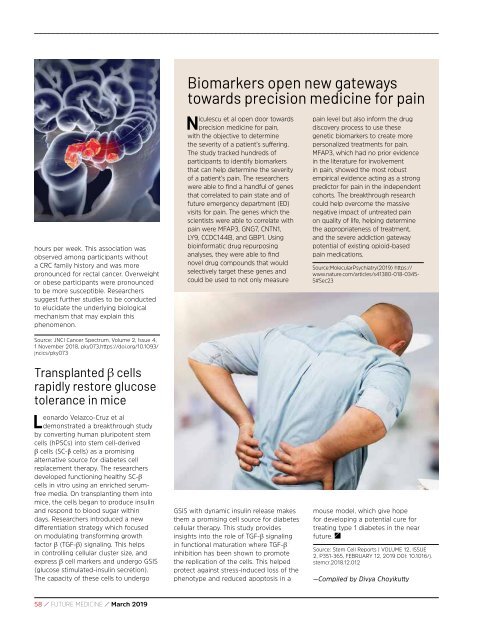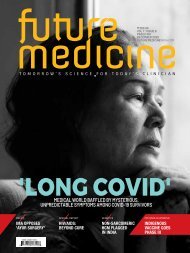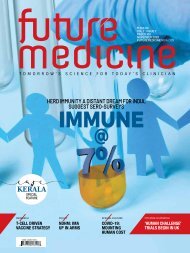March 2019 digital v1
You also want an ePaper? Increase the reach of your titles
YUMPU automatically turns print PDFs into web optimized ePapers that Google loves.
hours per week. This association was<br />
observed among participants without<br />
a CRC family history and was more<br />
pronounced for rectal cancer. Overweight<br />
or obese participants were pronounced<br />
to be more susceptible. Researchers<br />
suggest further studies to be conducted<br />
to elucidate the underlying biological<br />
mechanism that may explain this<br />
phenomenon.<br />
Biomarkers open new gateways<br />
towards precision medicine for pain<br />
Niculescu et al open door towards<br />
precision medicine for pain,<br />
with the objective to determine<br />
the severity of a patient’s suffering.<br />
The study tracked hundreds of<br />
participants to identify biomarkers<br />
that can help determine the severity<br />
of a patient’s pain. The researchers<br />
were able to find a handful of genes<br />
that correlated to pain state and of<br />
future emergency department (ED)<br />
visits for pain. The genes which the<br />
scientists were able to correlate with<br />
pain were MFAP3, GNG7, CNTN1,<br />
LY9, CCDC144B, and GBP1. Using<br />
bioinformatic drug repurposing<br />
analyses, they were able to find<br />
novel drug compounds that would<br />
selectively target these genes and<br />
could be used to not only measure<br />
pain level but also inform the drug<br />
discovery process to use these<br />
genetic biomarkers to create more<br />
personalized treatments for pain.<br />
MFAP3, which had no prior evidence<br />
in the literature for involvement<br />
in pain, showed the most robust<br />
empirical evidence acting as a strong<br />
predictor for pain in the independent<br />
cohorts. The breakthrough research<br />
could help overcome the massive<br />
negative impact of untreated pain<br />
on quality of life, helping determine<br />
the appropriateness of treatment,<br />
and the severe addiction gateway<br />
potential of existing opioid-based<br />
pain medications.<br />
Source:MolecularPsychiatry(<strong>2019</strong>) https://<br />
www.nature.com/articles/s41380-018-0345-<br />
5#Sec23<br />
Source: JNCI Cancer Spectrum, Volume 2, Issue 4,<br />
1 November 2018, pky073,https://doi.org/10.1093/<br />
jncics/pky073<br />
Transplanted β cells<br />
rapidly restore glucose<br />
tolerance in mice<br />
Leonardo Velazco-Cruz et al<br />
demonstrated a breakthrough study<br />
by converting human pluripotent stem<br />
cells (hPSCs) into stem cell-derived<br />
β cells (SC-β cells) as a promising<br />
alternative source for diabetes cell<br />
replacement therapy. The researchers<br />
developed functioning healthy SC-β<br />
cells in vitro using an enriched serumfree<br />
media. On transplanting them into<br />
mice, the cells began to produce insulin<br />
and respond to blood sugar within<br />
days. Researchers introduced a new<br />
differentiation strategy which focused<br />
on modulating transforming growth<br />
factor β (TGF-β) signaling. This helps<br />
in controlling cellular cluster size, and<br />
express β cell markers and undergo GSIS<br />
(glucose stimulated-insulin secretion).<br />
The capacity of these cells to undergo<br />
GSIS with dynamic insulin release makes<br />
them a promising cell source for diabetes<br />
cellular therapy. This study provides<br />
insights into the role of TGF-β signaling<br />
in functional maturation where TGF-β<br />
inhibition has been shown to promote<br />
the replication of the cells. This helped<br />
protect against stress-induced loss of the<br />
phenotype and reduced apoptosis in a<br />
mouse model, which give hope<br />
for developing a potential cure for<br />
treating type 1 diabetes in the near<br />
future.<br />
Source: Stem Cell Reports | VOLUME 12, ISSUE<br />
2, P351-365, FEBRUARY 12, <strong>2019</strong> DOI: 10.1016/j.<br />
stemcr.2018.12.012<br />
—Compiled by Divya Choyikutty<br />
58 / FUTURE MEDICINE / <strong>March</strong> <strong>2019</strong>


















